The global imitation whipped cream market is projected to grow from USD 1.2 billion in 2025 to approximately USD 2.1billion by 2035, recording an absolute increase of USD 920 billion over the forecast period. This translates into a total growth of 72.4%, with the market forecast to expand at a compound annual growth rate (CAGR) of 5.6% between 2025 and 2035. The overall market size is expected to grow by nearly 1.72X during the same period, supported by increasing consumer demand for plant-based dairy alternatives, rising lactose intolerance awareness, and growing preference for vegan food products with extended shelf life and cost-effectiveness.
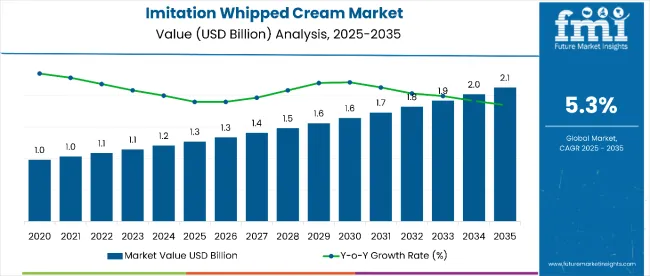
Imitation Whipped Cream Market Key Takeaways
| Metric | Value |
|---|---|
| Estimated Value in (2025E) | USD 1.2 billion |
| Forecast Value in (2035F) | USD 2.1 billion |
| Forecast CAGR (2025 to 2035) | 5.6% |
Between 2025 and 2030, the imitation whipped cream market is projected to expand from USD 1.2 billion to USD 1,630 billion, resulting in a value increase of USD 360 billion, which represents 39.1% of the total forecast growth for the decade. This phase of growth will be shaped by rising consumer awareness about vegan diet benefits, increasing demand for dairy-free formulations, and growing penetration of plant-based products in commercial food service operations. Food manufacturers are expanding their imitation whipped cream product portfolios to address the growing demand for convenient, shelf-stable alternatives to traditional dairy products.
From 2030 to 2035, the market is forecast to grow from USD 1,630 billion to USD 2.1billion, adding another USD 560 billion, which constitutes 60.9% of the overall ten-year expansion. This period is expected to be characterized by expansion of modern trade formats, integration of advanced emulsification technologies in formulations, and development of premium plant-based alternatives. The growing adoption of vegan lifestyle trends and health-conscious consumption patterns will drive demand for imitation whipped cream products with enhanced nutritional profiles and improved texture characteristics.
Between 2020 and 2025, the imitation whipped cream market experienced steady expansion, driven by increasing consumer focus on dairy-free alternatives and growing awareness of lactose intolerance issues. The market developed as food manufacturers recognized the need for cost-effective, shelf-stable solutions to meet rising demand for plant-based ingredients. Health-conscious consumer trends and dietary restrictions began emphasizing the importance of non-dairy alternatives in commercial food preparation and home baking applications.
Market expansion is being supported by the increasing consumer demand for plant-based dairy alternatives and the corresponding preference for vegan-friendly food products. Modern consumers are increasingly focused on health-conscious dietary choices that accommodate lactose intolerance, dietary restrictions, and ethical considerations related to animal welfare. Imitation whipped cream's proven effectiveness in providing similar taste and texture experiences while offering extended shelf life and cost advantages makes it a preferred ingredient in both commercial and residential applications.
The growing emphasis on convenient food preparation and cost-effective ingredients is driving demand for imitation whipped cream products derived from vegetable oils and plant-based emulsifiers. Consumer preference for versatile products that combine functionality with affordability is creating opportunities for innovative formulations. The rising influence of dietary health trends and nutritional awareness is also contributing to increased product adoption across different demographic segments and foodservice operations. Governments across the globe are pouring huge amounts to support the dairy industry.
The market is segmented by nature and form. By nature, the market is divided into conventional and organic variants. In terms of form, the market is segmented into powder and liquid formats. By distribution channels, products reach consumers through e-commerce, pharmacies, mass retail, and specialty food retail outlets. Regionally, the market spans North America, Latin America, Western Europe, Eastern Europe, East Asia, South Asia & Pacific, and Middle East & Africa.
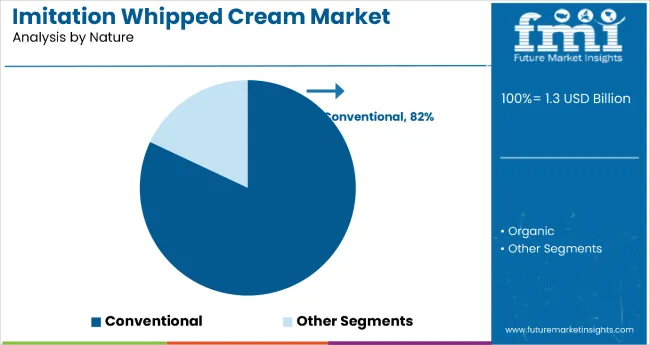
The conventional nature segment is projected to account for 82% of the imitation whipped cream market in 2025, reaffirming its position as the dominant category variant. Consumers increasingly recognize conventional imitation whipped cream for its longer shelf life, consistent performance characteristics, and cost-effectiveness compared to organic alternatives. Conventional formulations provide reliable foam creation properties and stable texture profiles that meet both commercial foodservice requirements and home baking applications.
This segment forms the foundation of most product offerings, representing the most accessible and widely distributed option in the imitation whipped cream category. Manufacturing efficiency and established supply chains continue to strengthen the competitive positioning of conventional variants. With consumer preferences emphasizing value and performance reliability, conventional imitation whipped cream aligns with both budget-conscious purchasing decisions and consistent quality expectations across diverse applications.
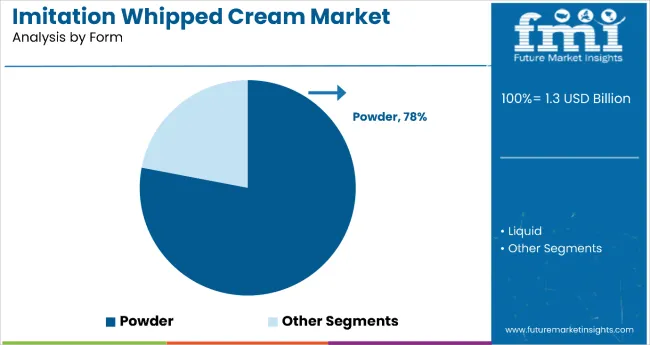
Powder form is projected to represent 78% of imitation whipped cream demand in 2025, underscoring its role as the preferred format for convenient preparation and extended storage capabilities. Consumers gravitate toward powder variants for their shelf stability, reduced refrigeration requirements, and ability to control consistency through reconstitution methods. Positioned as versatile, cost-effective solutions, powder formats offer both convenience benefits for storage and transportation, and flexibility for portion control in commercial applications.
The segment is supported by the rising popularity of bulk purchasing strategies and inventory management efficiency in foodservice operations. Additionally, manufacturers are increasingly developing powder formulations with enhanced dissolution properties and improved flavor stability, enhancing appeal and supporting premium positioning. As cost-conscious consumers and commercial users prioritize convenience and storage efficiency, powder-based imitation whipped cream products will continue to dominate market demand, reinforcing their practical advantages within the dairy alternatives segment.
The imitation whipped cream market is advancing steadily due to increasing consumer demand for plant-based dairy alternatives and growing preference for cost-effective food ingredients. However, the market faces challenges including formulation complexity in achieving optimal foam properties, quality consistency concerns, and competition from traditional dairy products. Innovation in emulsification technologies and sustainable ingredient sourcing continue to influence product development and market expansion patterns.
Expansion of Modern Trade and E-commerce Distribution
The growing adoption of modern retail formats is enabling manufacturers to reach consumers through organized distribution channels and provide enhanced product visibility. Online platforms offer convenience, detailed product information, and bulk purchasing options that influence buying decisions. Digital marketing strategies and direct-to-consumer sales are driving brand awareness and product adoption, particularly among health-conscious demographics who prefer convenient shopping experiences.
Integration of Advanced Emulsification and Stabilization Technologies
Modern imitation whipped cream manufacturers are incorporating advanced emulsification systems, improved stabilizers, and enhanced foam-creating agents to optimize product performance and shelf stability. These technologies improve the texture and mouthfeel characteristics while extending product shelf life and providing better user experience. Advanced formulation techniques also enable combination products that deliver multiple functional benefits in single applications.
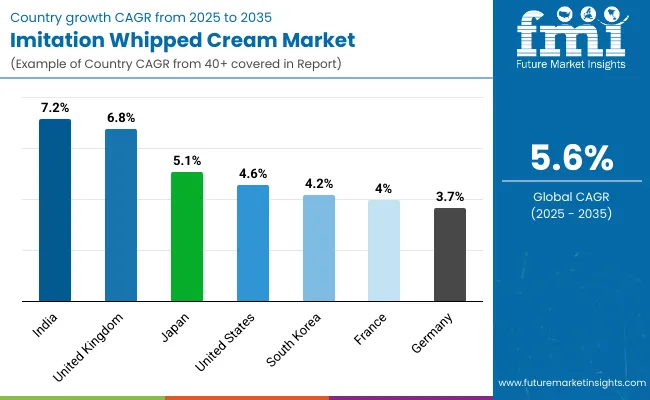
| Countries | CAGR (2025 to 2035) |
|---|---|
| India | 7.2% |
| United Kingdom | 6.8% |
| Japan | 5.1% |
| United States | 4.6% |
| South Korea | 4.2% |
| France | 4.0% |
| Germany | 3.7% |
The imitation whipped cream market is experiencing steady growth globally, with India leading at a 7.2% CAGR through 2035, driven by rising demand for plant-based dairy alternatives, increasing health consciousness, and growing penetration of modern food retail formats. The United Kingdom follows closely at 6.8%, supported by strong vegan food adoption and increasing dietary accommodation needs. Japan shows robust growth at 5.1%, emphasizing quality formulations and advanced food technology integration. The United States records 4.6%, focusing on established distribution networks and convenient baking ingredients. South Korea demonstrates 4.2% growth, driven by modern lifestyle adoption and premium food trends. France shows 4.0% expansion, leveraging culinary heritage and gourmet food applications. Germany shows consistent growth at 3.7%, emphasizing quality formulations and sustainable food production practices.
The report covers an in-depth analysis of 40+ countries; seven top-performing countries are highlighted below.
Revenue from imitation whipped cream in India is expanding at a CAGR of 7.2%, supported by increasing health consciousness, growing awareness of lactose intolerance, and rising penetration of plant-based food alternatives. The country's young demographic profile and increasing exposure to global food trends are driving demand for convenient dairy substitutes. International food brands and domestic manufacturers are establishing distribution channels to serve the growing demand for accessible, shelf-stable food ingredients.
Demand for imitation whipped cream in the USA is projected to grow at a CAGR of 4.6%, supported by consumer preference for vegan food products and convenient baking solutions. American consumers are increasingly focused on dietary accommodation, ingredient transparency, and sustainable food practices. The market is characterized by strong demand for versatile formulations that combine plant-based ingredients with reliable performance characteristics for both commercial and residential applications.
Revenue from imitation whipped cream in Germany is projected to grow at a CAGR of 3.7% through 2035, driven by the country's strong focus on food quality, sustainable production methods, and consumer preference for reliable ingredient performance. German consumers consistently demand high-quality, cost-effective products that deliver consistent results while maintaining ingredient safety and environmental responsibility.
Revenue from imitation whipped cream in the UK is projected to grow at a CAGR of 6.8% through 2035, supported by rising consumer interest in vegan food products and dietary accommodation solutions. British consumers value ingredient transparency, health benefits, and convenient food preparation, positioning imitation whipped cream as a core component of modern cooking routines.
Revenue from imitation whipped cream in Japan is projected to grow at a CAGR of 5.1% through 2035, driven by the country's strong focus on food technology, premium product positioning, and consumer preference for high-quality formulations. Japanese consumers consistently demand innovative, multifunctional products that deliver superior performance while maintaining ingredient purity.
Revenue from imitation whipped cream in South Korea is projected to grow at a CAGR of 4.2% through 2035, supported by increasing adoption of modern food preparation methods and growing interest in convenient baking solutions. Korean consumers are increasingly focused on lifestyle convenience, premium food experiences, and health-conscious dietary choices.
Revenue from imitation whipped cream in France is projected to grow at a CAGR of 4.0% through 2035, supported by the country's strong culinary tradition and sophisticated understanding of food preparation techniques. French consumers prioritize quality, taste experience, and culinary performance, making imitation whipped cream an important ingredient in professional and home cooking applications.
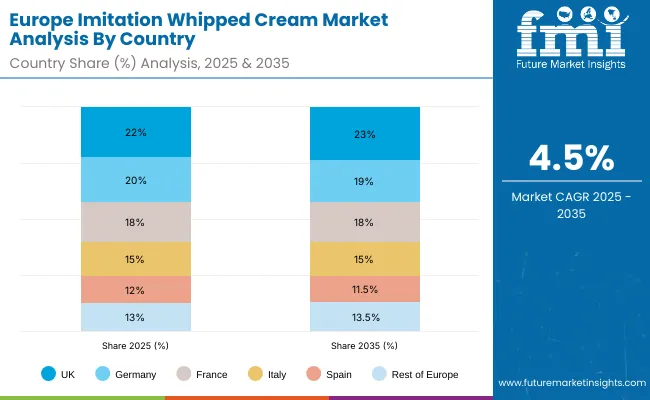
The imitation whipped cream market in Europe is projected to grow from USD 254.0 billion in 2025 to USD 394.5 billion by 2035, registering a CAGR of 4.5% over the forecast period. The United Kingdom is expected to lead the regional market with 22.0% in 2025, rising to 23.0% by 2035 as convenience formats and plant-based dessert solutions gain traction in retail and foodservice. Germany follows at 20.0% in 2025, moderating slightly to 19.0% by 2035 as market growth there tracks a more mature bakery and confectionery sector.
France holds 18.0% in 2025, remaining broadly stable at 18.0% by 2035 supported by premium and artisanal RTD dessert adoption. Italy accounts for 15.0% in 2025, staying near 15.0% by 2035 as culinary and patisserie applications continue to adopt non-dairy whipped toppings. Spain represents 12.0% in 2025, easing to 11.5% by 2035 amid slower per-capita consumption growth, while the Rest of Europe (Nordic, BENELUX, Eastern Europe and others) makes up the balance at 13.0% in 2025, edging to 13.5% by 2035 driven by rising interest in vegan bakery ingredients and cold-chain improvements.
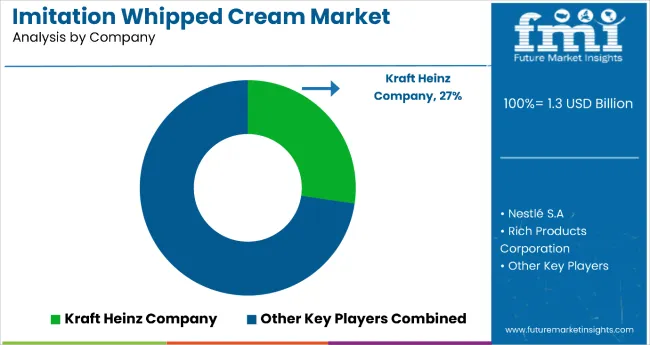
The imitation whipped cream market is characterized by competition among established food manufacturers, specialty ingredient companies, and emerging plant-based food players. Companies are investing in advanced formulation technologies, sustainable sourcing practices, efficient packaging solutions, and distribution network expansion to deliver effective, affordable, and accessible dairy alternative products. Brand positioning, ingredient innovation, and channel diversification are central to strengthening product portfolios and market presence.
Kraft Heinz Company leads the market with significant global presence, offering reliable imitation whipped cream formulations with a focus on cost-effectiveness and consistent performance. Nestlé S.A. provides comprehensive plant-based product ranges with emphasis on quality and brand recognition across multiple distribution channels. Rich Products Corporation delivers specialized foodservice solutions with focus on commercial applications and bulk ingredient supply. Danone focuses on health-conscious formulations that combine plant-based ingredients with nutritional benefits.
Grupo Chantilly SA de CV and Trader Joe's Company provide accessible retail options with competitive pricing and consumer-friendly positioning. Kerry emphasizes ingredient innovation and technical expertise in emulsification technologies. Eurocas Group of Companies, Dos Anclas, and PURATOS provide specialized solutions for commercial baking and foodservice applications with focus on performance reliability and supply chain efficiency.
The decade ahead is pivotal for imitation whipped cream. Rising veganism, lactose intolerance, sugar-reduction policies, and affordability pressures are converging with advances in plant-based formulation and convenience formats. This creates eight powerful growth pathways, together unlocking USD 5-12 billion in incremental revenue by 2030-2035.
The success of imitation whipped cream, driven by plant-based demand, cost-efficiency pressures, and ESG-linked food reformulation, will not only expand dairy-alternative adoption but also strengthen the resilience of food supply chains. It will consolidate emerging markets as hubs for value-added non-dairy food production and align advanced economies with clean-label, climate-conscious diets. This calls for a concerted effort by all stakeholders - governments, industry bodies, suppliers, OEMs, and investors. Each can be a crucial enabler in preparing the market for its next phase of growth.
| Items | Values |
|---|---|
| Quantitative Units (2025) | USD 1.2 Billion |
| Nature | Conventional, Organic |
| Form | Powder, Liquid |
| Regions Covered | North America, Latin America, Western Europe, Eastern Europe, East Asia, South Asia & Pacific, Middle East & Africa |
| Countries Covered | United States, Germany, India, United Kingdom, France, Italy, Brazil, Canada, Japan, Australia, Spain, Netherlands, Saudi Arabia, Switzerland and 40+ countries |
| Key Companies Profiled | Kraft Heinz Company, Nestlé S.A., Rich Products Corporation, Danone, Grupo Chantilly SA de CV, Trader Joe's Company, Kerry, Eurocas Group of Companies, Dos Anclas, PURATOS |
| Additional Attributes | Market concentration analysis by tier segments, technological innovations in emulsification systems, regulatory compliance requirements, sustainability initiatives in plant-based ingredient sourcing, competitive landscape analysis, buyer preferences for conventional versus organic variants |
The market is expected to grow at a CAGR of 5.6% throughout the forecast period.
By 2035, the sales value is expected to be worth USD 2.1 Billion.
Demand for vegan food is increasing demand for Powder Induction and Dispersion Systems.
North America is expected to dominate the global consumption.
Some of the key players in manufacturing include Dos Anclas, PURATOS, Hydrosol GmbH & Co. KG and more.






Our Research Products

The "Full Research Suite" delivers actionable market intel, deep dives on markets or technologies, so clients act faster, cut risk, and unlock growth.

The Leaderboard benchmarks and ranks top vendors, classifying them as Established Leaders, Leading Challengers, or Disruptors & Challengers.

Locates where complements amplify value and substitutes erode it, forecasting net impact by horizon

We deliver granular, decision-grade intel: market sizing, 5-year forecasts, pricing, adoption, usage, revenue, and operational KPIs—plus competitor tracking, regulation, and value chains—across 60 countries broadly.

Spot the shifts before they hit your P&L. We track inflection points, adoption curves, pricing moves, and ecosystem plays to show where demand is heading, why it is changing, and what to do next across high-growth markets and disruptive tech

Real-time reads of user behavior. We track shifting priorities, perceptions of today’s and next-gen services, and provider experience, then pace how fast tech moves from trial to adoption, blending buyer, consumer, and channel inputs with social signals (#WhySwitch, #UX).

Partner with our analyst team to build a custom report designed around your business priorities. From analysing market trends to assessing competitors or crafting bespoke datasets, we tailor insights to your needs.
Supplier Intelligence
Discovery & Profiling
Capacity & Footprint
Performance & Risk
Compliance & Governance
Commercial Readiness
Who Supplies Whom
Scorecards & Shortlists
Playbooks & Docs
Category Intelligence
Definition & Scope
Demand & Use Cases
Cost Drivers
Market Structure
Supply Chain Map
Trade & Policy
Operating Norms
Deliverables
Buyer Intelligence
Account Basics
Spend & Scope
Procurement Model
Vendor Requirements
Terms & Policies
Entry Strategy
Pain Points & Triggers
Outputs
Pricing Analysis
Benchmarks
Trends
Should-Cost
Indexation
Landed Cost
Commercial Terms
Deliverables
Brand Analysis
Positioning & Value Prop
Share & Presence
Customer Evidence
Go-to-Market
Digital & Reputation
Compliance & Trust
KPIs & Gaps
Outputs
Full Research Suite comprises of:
Market outlook & trends analysis
Interviews & case studies
Strategic recommendations
Vendor profiles & capabilities analysis
5-year forecasts
8 regions and 60+ country-level data splits
Market segment data splits
12 months of continuous data updates
DELIVERED AS:
PDF EXCEL ONLINE
Demand for Imitation Whipped Cream in EU Size and Share Forecast Outlook 2025 to 2035
Whipped Topping Concentrate Market Size and Share Forecast Outlook 2025 to 2035
Cream of Tartar Market Size and Share Forecast Outlook 2025 to 2035
Cream Separator Market Size and Share Forecast Outlook 2025 to 2035
Cream Cheese Market Analysis – Size, Share, and Forecast 2025 to 2035
BB Cream Market Analysis by Skin Type, SPF Type, End Uses, Sales Channel and Region through 2025 to 2035
Ice Cream Coating Market Size and Share Forecast Outlook 2025 to 2035
Ice-cream Premix and Stabilizers Market Size and Share Forecast Outlook 2025 to 2035
Ice Cream Equipment Market Size and Share Forecast Outlook 2025 to 2035
Analysis and Growth Projections for Ice Cream and Frozen Dessert Market from 2025 to 2035
Ice Cream Packaging Market - Outlook 2025 to 2035
Ice Cream Processing Equipment Market Growth - Trends, Demand & Innovations 2025 to 2035
Ice Cream Service Supplies Market - Premium Serving Essentials 2025 to 2035
Ice Cream Parlor Market Analysis by Type, Product Type, and Region Through 2035
Breaking Down Market Share in the Ice Cream Parlor Industry
Ice Cream Container Market Size & Trends Forecast 2024-2034
Dry Cream Substitute Market
Ice-cream Maker Market
Precis of Key Trends Shaping Sour Cream Powder Business Landscape.
DMAE Cream Market Report – Growth & Industry Trends 2024-2034

Thank you!
You will receive an email from our Business Development Manager. Please be sure to check your SPAM/JUNK folder too.
Chat With
MaRIA